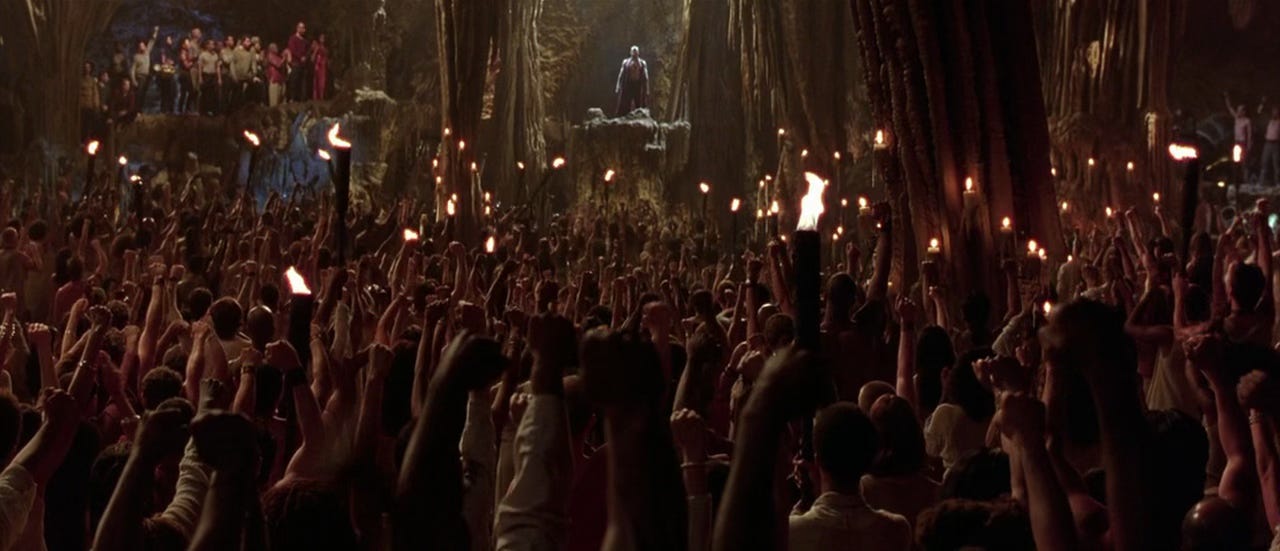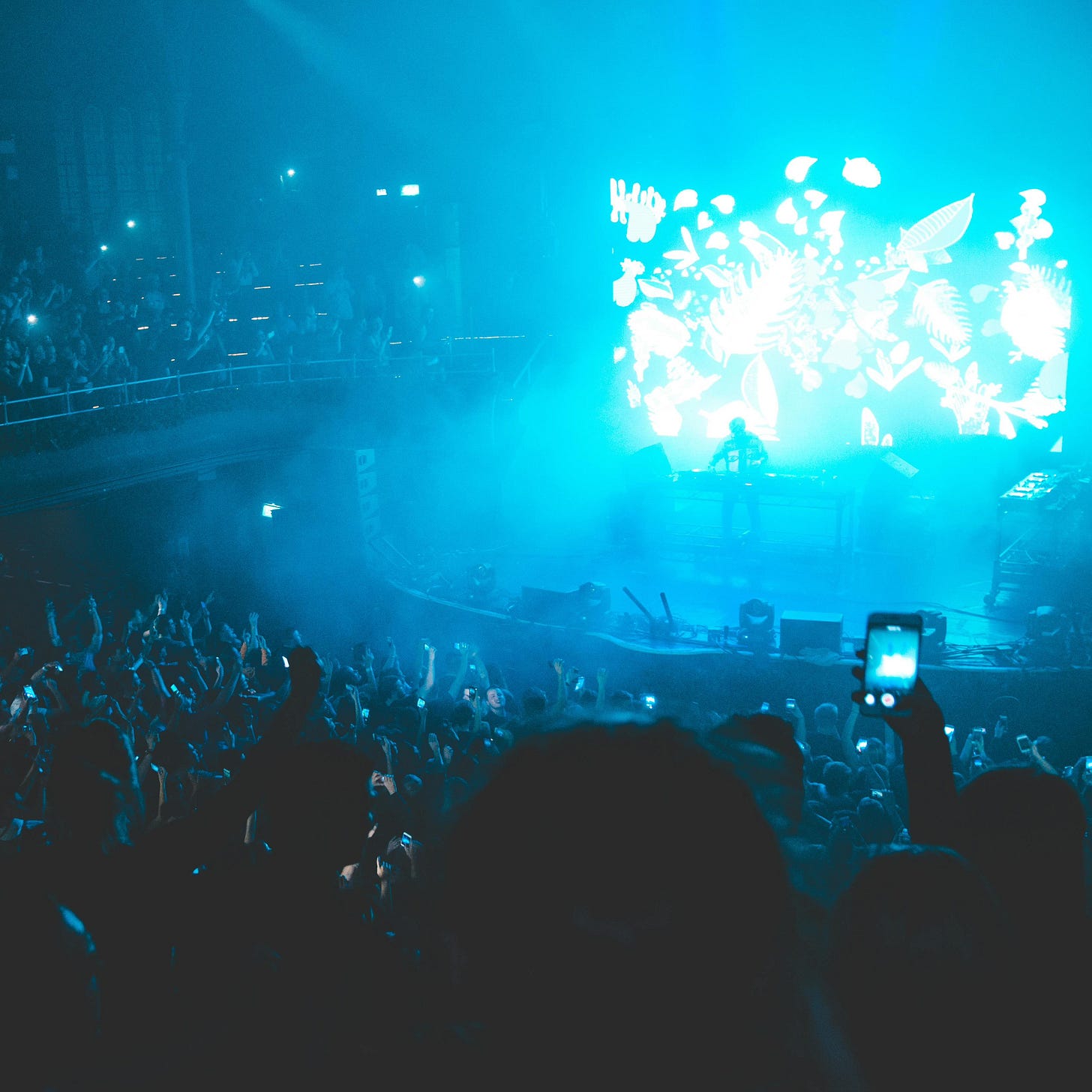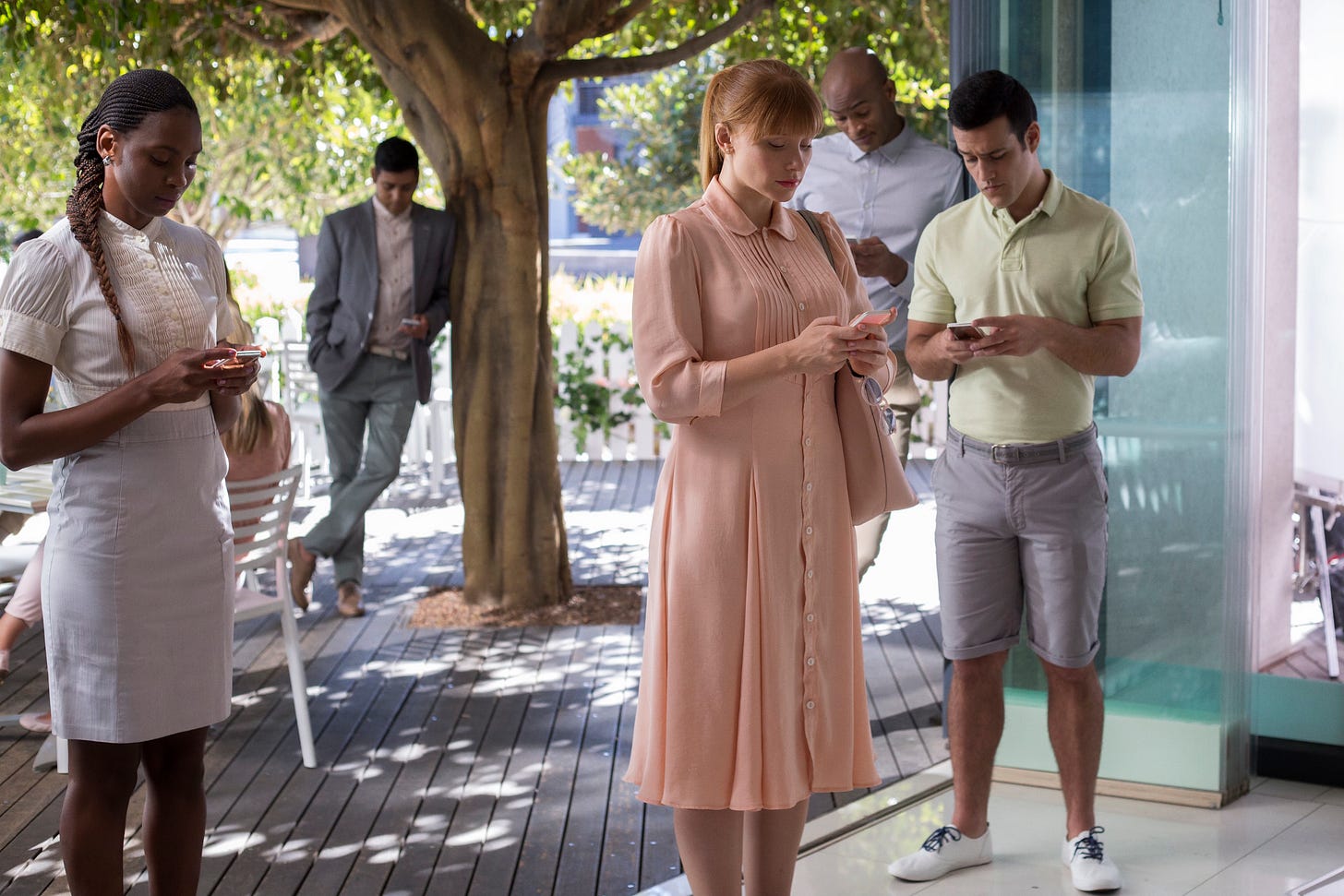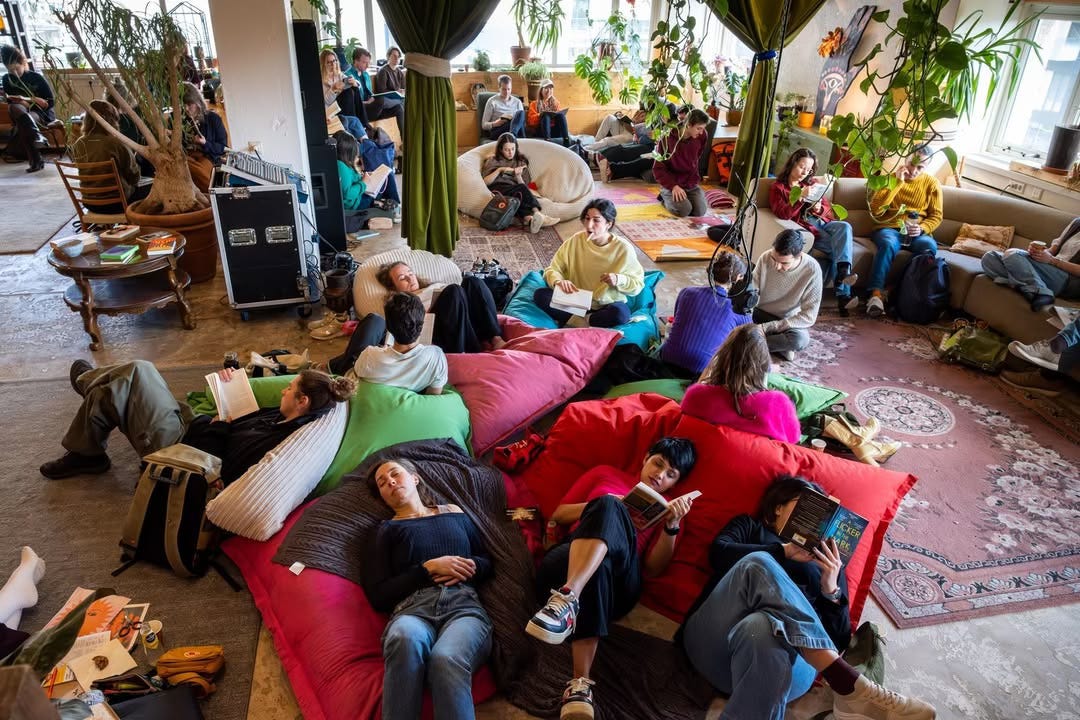Welcome to Mutant Futures: a newsletter about culture, futurism and strategy.
In this edition, I’m looking at anti-smartphone shifts.
Let’s get into it 🔬
Humans just want to be human again—desperately so.
As a chronically online species, a dominant theme of this decade so far has been our yearning for offline escape.1 But fast forward to 2025 and the plot feed has thickened. We’re dealing with unprecedented levels of digital fatigue, and a lot of us just want to hurl our phones into outer space.
While IRL gatherings have been mushrooming in urban areas ever since Covid-19 restrictions were lifted, we’re now witnessing a boom in anti-smartphone events. It’s not just about touching grass, it’s about banning cyborgs from the picnic. Part-human, part-device, there’s a cyborg in all of us now. These events recognise the need to take off the cybernetic enhancements and let our humanity breathe again.
How is this phone-free movement evolving, and what’s the outlook for those trying to push back against a normalised culture of contentification?
No phones on the dancefloor 📵
The clubbing scene offers a prime case study on how smartphone etiquette in public spaces is evolving. The debate over phone-free clubbing has been raging since as early as 2016, if not earlier.3 After much fuel was thrown on the fire by years of unchecked crowd behaviour, more clubs than ever have introduced an anti-smartphone policy. And in 2024, the Berghainification of dancefloors gained mainstream traction. What began as a privacy measure to safeguard LGBTQ+ and sex-positive spaces is now being co-opted across the nightclub sector, to bring back the immersive, communal energy of the dancefloor. The debate remains divisive, and those that oppose the bans argue that phones can amplify the promotional reach of a club night and boost the careers of the artists. And then there’s the argument about letting people document the moment—but at what cost to the culture? Elijah, a UK grime originator and music industry veteran, had this to say only last month:4
I feel like this is one of the biggest disrespects in culture now. Everyone having their phones out in a room, it doesn't just take you out of the room there and then. It makes people on edge, in a way that I've never really experienced before. […] It feels like you're under CCTV, like, a thousand CCTV's at once. Why would you wanna break form? Why would you wanna dance in a crazy way?
Elijah raises a point that we’ve completely taken for granted: the omnipresence of smartphones risks flattening our social behaviour. Surveillance 2.0. Whether it’s on or off the dancefloor, when the cameras are out, we’re subconsciously suppressing our self-expression. Because if we did ‘too much’, the cameras might turn on us. And suddenly we’re dancing bears for other people’s entertainment (and possibly their IG Story).
These concerns echo the warnings of Black Mirror’s Nosedive episode. To recap, it tells the story of Lacie, who’s driven to curate and dress up her every move to get a perfect digital star-rating from others. But her relentless pursuit of social proof eventually sees her crashing out. The obvious takeaway from Nosedive is that scoring our interpersonal moments would spell a shitshow for society. It’s been nearly a decade since the episode aired and thankfully, star ratings didn’t take over social media. But there’s still something Nosedive-ish about our society today. We may not be rating each other out of five, but we’re still adjusting our behaviour under an invisible social score. Every camera held up in a public space, every post, every reaction—it’s all a form of interveillance (where we monitor each other and ourselves). Nosedive wasn’t just about a rating system, it was about a system where we’re compelled to distort who we are IRL to suit online expectations, thanks to our phones.
⭐️⭐️⭐️⭐️⭐️
Whichever side of the no-phone debate you stand on, it’s clear that the ability to enjoy a space free from contentification comes at a premium. And this shift is entering a new phase.
The Luddite experience boom
The curation of anti-smartphone spaces is gaining popularity beyond dancefloors. Since early 2024, Dutch-founded Offline Club has been organising phone-free gatherings at cafés, restaurants and even churches, providing refuge for the digitally fatigued, addicted and jaded. They provide dedicated lockers, so-called phone hotels, for guests to stow away their devices on arrival. Their activities are designed to let humans be human again: to talk and get to know one another while painting, playing board games, hand-crafting something, and so on. There’s no pressure to socialise—some participants take a beat while reading a book. Others simply take a nap. Everyone is peacefully blending in. It’s one big Luddite experience.
And it’s a fascinating case study, in the age of normalised self-broadcasting and documenting. By switching off our Pavlovian urge to reach for our phones when something interesting happens, these events take us back to a nostalgic, by-gone era. We get to relive a feeling we’ve basically forgotten (or barely got to experience, if you’re Gen Z). And who doesn’t want to reconnect with their inner child?
Unsurprisingly, Offline Club’s events have seen rapid growth in a short space of time: one year in, they’ve hosted over 150 events, in 11 different cities, across 7 countries. Consistently sold out. Their swift international expansion is thanks to their franchising model: anyone can apply to become a ‘City Leader’, and set up a local Offline Club using the company’s branding and know-how. It’s a savvy business move. The founder’s goal is to get 100 million people to experience an OC event—he wants to reach the masses.5 Ironically, a viral Reel on their Instagram page propelled the company massively forward. But to be fair, Instagram is likely the best place to reach those who need disconnecting the most. While people get to disconnect, footage of this is captured and uploaded for promotional purposes to OC’s social media—and this strategy seems to be working. Ironies aside, if these events saw mainstream success, other social clubs (e.g. a supper club) could seize the opportunity to attract more guests by introducing their own anti-phone policy. Whether this halo effect could actually be unleashed remains TBC.
Having fallen down a rabbit hole for this post, I couldn’t decide whether the commodification of something quite ordinary (putting your phone away) could have a positive cultural impact. Should we embrace it, or does it risk contributing to the ‘privacy as a luxury’ shift, in that it’s becoming a privilege for the few, not the many, to go off-grid?
Let’s get into that for the last section of this post.
The digital detox paradox
Offline Club’s vision is that by attending one of their events, we can wake up to our dysfunctional relationship with our phones, then redesign it for the better. Their mission is to be accessible—their events last 2-3 hours and tickets are around €10 / £15 for activity meetups. It sounds democratic, but the picture gets more complicated once you visit their website. The company also offers conventional detox retreats, some up to five days long. I’d be surprised if they weren’t trying to upsell the retreats to those who attend the micro-detox events.
The paradox of the digital detox industry is that its growth only stands to gain from smartphone addiction and being discovered on social media. Once a detox events company is established enough, it risks becoming indifferent to the real enemy—the big social media platforms and their algorithmic tyranny.

My concern is that the movement Offline Club started could simply settle for being a ‘pressure release valve’—an illusion that society is healing from smartphone addiction. If you watched The Matrix Reloaded, you’ll remember that Zion (the ‘unplugged’ city and home of the Resistance), was allowed to exist by the machines. Why? Because they realised that allowing the Resistance, while containing it in Zion, made the whole system more stable. The status quo depended on the illusion of a counter-movement, to keep the humans from realising they were still playing by the system’s rules. This pacification of counter-movements by the system was a central tenet of Mark Fisher’s Capitalist Realism. Instead of silencing the rebellion, capitalism neutralises it by making it monetisable and consumable.
Regardless of how the business of anti-phone events evolves, the very concept might distract us from what it takes to find true community, a word which gets thrown around a lot in branding and marketing circles these days. We’ve romanticised community to the point of giving us community FOMO. A by-product of the loneliness epidemic. Anti-phone events might offer a quick fix by encouraging situational or temporary communities, but once they’ve left those spaces, people have to return to the Matrix, the status quo.
Mindful smartphone use is obviously a good thing, but I don’t think it’s as simple as unplugging from everything once in a while. I’ll be sharing my thoughts on this, and on the state of social media, in the next post.
If you read to the end of this post, you’re a real one! 💜 If you haven’t subbed already…
From his latest report on trending trends, META Trends.







Yes! The digital detox paradox is such an itchy brain topic I can’t pin down. I’ve been trying to write about it but can’t quite sort out the messy thoughts. Excited to read yours!
great point re: the digital detox economy. damned if you do, damned if you don't.